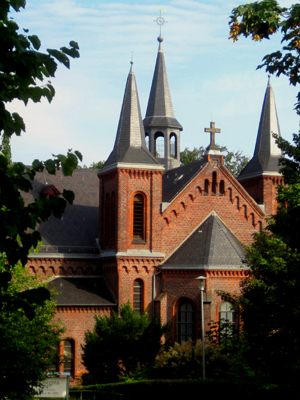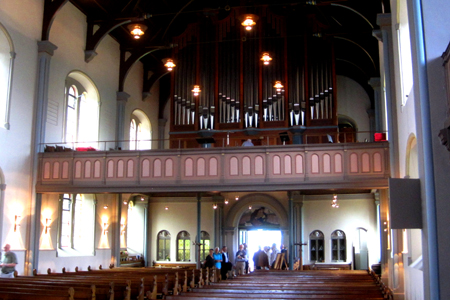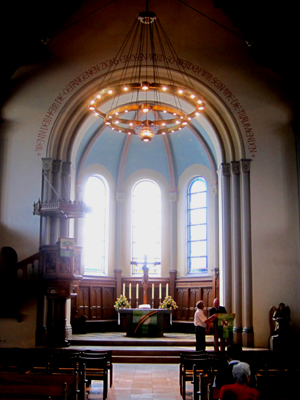| |
 |
 |
 |
| Comment on this report, or find other reports. |
 |
| Our Mystery Worshippers are volunteers who warm church pews for us around the world. If you'd like to become a Mystery Worshipper, start here. |
 |
| Find out how to reproduce this report in your church magazine or website. |
|
|
| 2736: Zionskirche (Zion Church), Bielefeld, Germany |
 |
 |
 |
Mystery Worshipper:
Portola.
The church:
Zionskirche (Zion Church), Bielefeld, Germany.
Denomination:
Evangelische Kirche von Westfalen, one of the 22 Lutheran, Reformed and United regional churches (Landeskirchen) that form the Evangelical Church in Germany (Evangelische Kirche in Deutschland – EKD).
The building:
An attractive red-brick building, cruciform in shape. It is located on Zion Hill within the community of Bethel. It was dedicated in November 1884 by Prince Albrecht of Prussia. Pastor Friedrich von Bodelschwingh, founder of Bethel, made suggestions regarding the design of the church: for example, that the church should be "very simple, as befitting poor people." Over the altar area is a passage from Psalm 126: "When the Lord redeems the prisoners of Zion, we will be like those who dream." Drums from Tanzania hang on one wall, indicating that a contribution from that country helped to build the two towers of the church. The bells were financed with a contribution from South Africa. Until 1970 there was segregated seating for men and women, healthy and sick. Nowadays healthy and disabled people worship together. There are six glass-enclosed alcoves located near the entrances and on the upper balconies, designed for severely disabled people who might suffer a seizure during a service – reportedly, some people have died during services while suffering convulsions.
The church:
Zion Church is the worship centre for the von Bodelschwingh Foundation of Bethel, arguably the largest Christian social welfare organization in Europe. It was founded in 1867 by Pastor Friedrich von Bodelschwingh for the treatment of epileptics, and developed into a settlement where they could live and work according to their abilities. He expanded Bethel to accommodate a wider variety of sick and needy people: mentally ill, disabled, orphans, alcoholics. He founded colonies for drifting, unemployed workers. He became a fundraiser. In 1903 he entered politics, becoming a member of the Prussian parliament, in order to influence the government to do more for the "brothers of the country roads," as he called the homeless unemployed. Bethel has international initiatives, providing care, support and education from birth to the grave. It serves in 250 branches within Germany, and more internationally. Every Protestant in Germany probaby knows about their work, because Bethel collects clothing and used stamps from almost every Evangelische congregation in the country. The Zion Church congregation offers an amazing variety of groups and events. The newsletter mentions five choirs and five brass bands. There are children’s groups, a football (soccer) team, a father-child group, offerings for men, women, seniors, Bible groups, Taize meditations, confirmation instruction and communities of deaconesses (Sarepta) and deacons (Nazareth).
The neighbourhood:
Bethel is a city-like diaconic community within the city of Bielefeld, in the north-east of North-Rhine Westphalia. Founded in 1214, Bielefeld is celebrating its 800th anniversary this year. Cultural events include an annual medieval market and a wine festival. The city was founded on the linen trade, which has since subsided, and its relative obscurity has paradoxically given it great notoriety online, in the form of the Bielefeld Consipiracy, which posits that the city does not exist. The city is actually home to more than 300,000 people and boasts a university, a 13th century castle, and some interesting medieval churches. It is also economically prosperous, centrally located in Europe, and served by transport links in all directions.
The cast:
Herr Pastor Hans Schmidt led the liturgy and preached. Greetings, readings and announcements were given by Herr Stefan Warmuth, member of the presbytery. The organ was played by Herr Diakon Müller.
The date & time:
Sunday, 3 August 2014, 10.00am.
What was the name of the service?
Gottesdienst (Divine Service) with Baptism.
How full was the building?
About 100, which is a small fraction of the building's capacity of 1600, but it did not look or feel like a small congregation.
Did anyone welcome you personally?
No, there was no personal welcome.
Was your pew comfortable?
Comfortable.
How would you describe the pre-service
atmosphere?
As people arrived they engaged in conversation, especially at the entrance. The ringing of the bells five minutes before the service began was stirring.
What were the exact opening words of the
service?
"So, then, you are no longer strangers and aliens, but you are fellow citizens with the saints and members of the household of God." (From Ephesians 2:19 – the text of the week for the 7th Sunday after Trinity.) The first words of the liturgy were: "In the name of God the Father, the Son and the Holy Spirit."
What books did the congregation use during the
service?
The regional hymnbook Evangelisches Gesangbuch für die Evangelische Kirche in Rheinland, die Evangelische Kirche von Westfalen und die Lippische Landeskirche, with the liturgy pasted into it.
What musical instruments were played?
The organ, a three-manual instrument by Karl Schuke of Berlin, installed in 1999 to replace earlier instruments.

Did anything distract you?
Some of the disabled people do not have control of the sounds they make, so that the service was punctuated with cries and indefinite vocal sounds, but this is, of course, part of the unique texture of a service in this church. The microphones in the church were set to such a high intensity level that there was often a high-pitched background noise.
Was the worship stiff-upper-lip, happy clappy, or
what?
It was a formal Lutheran service with no liturgical short-cuts (aside from omitting holy communion). The hymnbook did not include the notes for the music, so that most people sang from memory, unaccompanied. Six hymns were sung. The introductory greeting set a friendly tone: the presbytery member introduced the pastor, the organist and himself. He informed us of the baptism. He greeted the people listening in by means of speakers in other locations of Bethel and announced hymn numbers, so that they could sing along or, at least, follow the texts.
Exactly how long was the sermon?
17 minutes.
On a scale of 1-10, how good was the preacher?
9 – This was an intact sermon. The structure was transparent, the scriptural interpretation conscientious; the application of the biblical text to present day situations in the community of Bethel and within German society was convincing and attention-grabbing. The preacher offered enough content for three sermons in a surprisingly short period of time. Despite his lively tempo, the preacher was easy to listen to. His sermon was an example of German theological discipline at its best.
In a nutshell, what was the sermon
about?
The sermon text, Exodus 16:2-18 (God rains down bread from heaven upon the Israelites), was about a crisis in the desert sojourn of Israel. At a moment when starvation threatened and the people of Israel yearned for the flesh pots of Egypt, God sent quail and manna. These feedings can be explained by natural phenomena occurring in the Sinai desert up to the present day, demonstrating that God uses the resources he created. Considering that a louse is involved in the production of manna, it also shows that God has a sense of humour. This event points to three challenging tensions: first, between romanticising an idealized past (the flesh pots of Egypt) or embracing the present situation, which might seem distressing, but invariably offers more than meets the eye. Second, between an enslaving security (returning to Egypt) and a risky freedom (continuing the sojourn in trust). And third, between being satisfied with having enough or wanting to have more, which invariably leads to waste and exploitation. In the distribution of manna, God did not allow anyone to have too much or too little, regardless of how much was collected, revealing his will for mankind in general.
Which part of the service was like being in
heaven?
The father of the baptized child had been invited to explain the parents' choice of the so-called baptism text, a biblical text that is addressed to the baptized child as a word of blessing. He discovered the chosen text online by looking up a "Baptism Text Generator" offered by the Bavarian Lutheran Church. After answering two personal questions, he was offered ten possibilities and immediately recognized that "I will bless you... and you shall be a blessing" (Genesis 12:2) was exactly right for his child, to whom he spoke a blessing at the moment of birth. His presentation was a charming, unpretentious and sincere witness to his faith.
And which part was like being in... er... the other place?
Bethel experienced "the other place" on September 1, 1939, when Adolf Hitler signed the euthanasia order that commanded the killing of disabled persons. As a first step, Bethel was ordered to fill out report forms regarding its inhabitants. Bethel refused to cooperate and through unusually fortunate circumstances avoided having its inhabitants – with some exceptions – transported to death camps. This dark history is part of the background of every service in this church.
What happened when you hung around after the service looking lost?
No one took notice.
How would you describe the after-service
coffee?
There is an after-service coffee once a month, but not on this Sunday.
How would you feel about making this church your regular (where 10 = ecstatic, 0 = terminal)?
8 – I enjoy formal liturgical services and Lutheran chorales. The organist was excellent. At other times of the year the services are enriched by the various choirs and brass bands. I am not sure how the background noises of the disabled would affect me if I heard them Sunday after Sunday.
Did the service make you feel glad to be a
Christian?
Undoubtedly. The preacher offered something that, in my experience, is becoming increasingly rare: a scrupulous biblical interpretation as the basis of a sermon.

What one thing will you remember about all this in seven days' time?
The atmosphere of Zion Church: a pleasing combination of stone and wood, windows that let in lots of light, an altar area that enables one to focus immediately on the service. |
|
|
 |
 |
 |
| We rely on voluntary donations to stay online. If you're a regular visitor to Ship of Fools, please consider supporting us. |
 |
 |
 |
| The Mystery Pilgrim |
 |
| One of our most seasoned reporters makes the Camino pilgrimage to Santiago de Compostela in Spain. Read here. |
 |
 |
 |
| London churches |
 |
| Read reports from 70 London churches, visited by a small army of Mystery Worshippers on one single Sunday. Read here. |
| |
|
|
|
|


